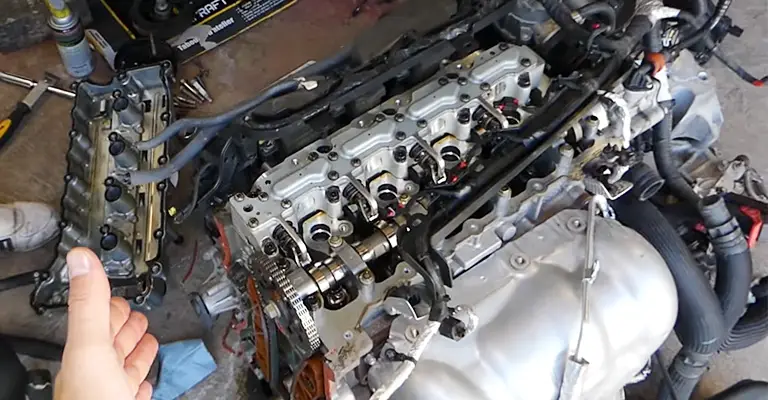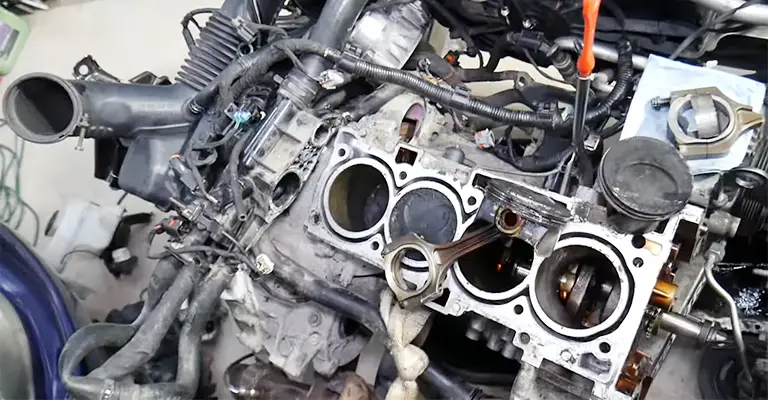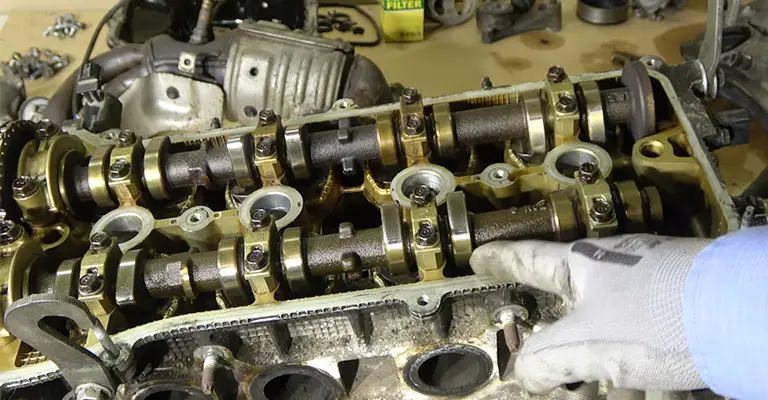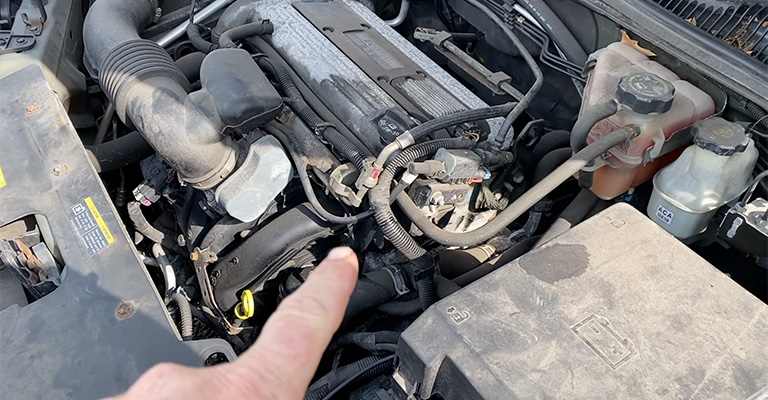Have you ever started a car and heard a knocking sound from the engine, but it then goes away? It can happen from time to time in most cars. However, if you experience it frequently, it’s a sign of problems with your vehicle. It could be a sticky valve lifter, worn engine components, piston slap, etc.
How do you even stop this rattling noise? This article discusses why your car engine knocks on startup and then goes away. It also outlines possible solutions.

5 Reasons Why a Car Engine Knocks on Startup then Goes Away (How to fix it)
Piston slap
A piston slap is often a cause of a cold start engine rattling noise. Normally, pistons in the cylinder should have a smooth up-and-down motion when the engine is running. Now, a piston slap is when the piston(s) and the cylinder wall don’t have tight tolerance (there is an excess clearance between pistons and cylinder walls); thus, the piston(s) rocks/rattles side to side on a slight angle inside the cylinder.
As a result, you’ll notice the engine rattles anytime you start the engine and then goes away after a short while once the piston head is heated and expanded. Notably, it’s a common issue for many vehicles during cold weather.

Most cars with about 150,000 to 200,000 miles on the clock aren’t likely to experience this problem. However, piston slaps can happen due to the following reasons:
- Old pistons
- Worn-out spark plugs
- Worn-out cylinder walls
- Design flaw
Possible Solution
An ideal solution to fix piston slap issues is an engine rebuild. It entails dismantling the engine and replacing damaged or worn-out parts with new ones. Consider getting a professional to handle this kind of job, especially if you don’t know how to do it.
Sticky lifters

A sticky valve lifter is another leading cause of engine rattles on startup, then goes away. A lifter is responsible for transmitting reciprocal motion from the camshaft lobes to the pushrods in a car engine. Therefore, when you have stuck lifter(s) in the bore, it leaves the valve open, causing minimal compression in the cylinder. As a result, it causes excessive ticking noise when you start the engine’s cylinder head.
Many factors cause sticky lifter issues, but most are oil-related. They include:
- Type of oil used- usually heavy oils (high viscosity engine oil) take longer to circulate the engine. It may cause valve lifters to get stuck.
- Types of oil filters- using a filter without an anti-drain check valve or a low-quality oil filter could lead to sticky lifters.
- Cam position- sometimes, the position of the can when an engine is stopped may cause an oil drain in valve lifters
Possible Solution
If your sticky lifters are taking long before they stop making noise after an engine startup, consider replacing them.
You should also change your engine regularly. However, consider using quality engine oils.
Worn components

When components such as the power steering pump, exhaust manifold, water pump, or alternators are worn out, you could easily experience a cold start noise that goes away after the engine warms up. However, the situation can worsen if any of the components fail entirely. Additionally, it could cause problems such as a slapped piston or sticky lifters that significantly contribute to your car’s engine knocking on startup.
Possible Solution
Get a professional to diagnose your car’s engine to determine the specific components with issues that need replacement or repair. This would easily prevent the complete failure of your engine in the future.
Oil drain-back

Oil drain back is another common cause of engine knocks on startups and then going away. Usually, an oil filter has a valve (check valve) designed to prevent oil from moving backward through the system. Therefore, if this valve doesn’t seal properly, the oil will drain out of your engine and collect in the oil pan. Additionally, it means the oil pump must pump the oil through all sensitive parts of the engine every time you start your car.
As a result, it causes some loud noise for a short period until the oil is circulated through the engine parts.
Possible Solution
Consider investing in a high-quality oil filter because it has a better check valve; therefore, it keeps the oil in the engine block ready for startup.
Main bearing wear

Usually, the bearing wears as car mileage increases. Main bearing wear is also caused by mixed lubrication with direct metal-to-metal contact between the bearing and crankshaft surface.
When the center bearing wears down and the crankshaft loses tolerance, it repeatedly hits the thrust bearing for several seconds when you start the engine after long periods. However, once the crank heats, this rattling sound goes away.
While this problem isn’t likely to cause other major mechanical issues, it causes a nuisance during startups.
Possible Solution
First, consider regular oil changes. Then, replace worn-out bearings as soon as possible or when rebuilding an engine. The main bearings don’t have a specified replacement interval.
Final thought
Anytime your car makes an engine rattle sound when you startup and it goes after a few seconds or minutes, it may be caused by any of the five problems outlined above. We also outlined possible solutions to help you fix these issues. Nonetheless, consider calling a mechanic to help fix this problem if you lack the skills and necessary tools.
Leave a Reply